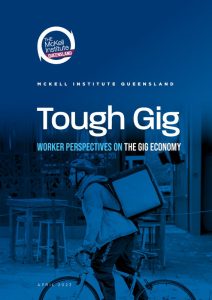A McKell, TWU and TEACHO survey of over 1,000 transport gig workers has revealed that low pay, job insecurity, and the absence of fair, safe and sustainable standards make genuine ‘flexibility’ an illusion.
A staggering 81 per cent of survey respondents depend on the income to survive, over three quarters have to work long hours to make ends meet, yet hourly pay decreases the more hours are worked.
The survey showed low pay and job insecurity are major safety concerns. More than half experience work-related stress, anxiety, and mental health issues, and 56 per cent of food delivery riders reported feeling pressure to rush and take risks on the road to earn enough money and avoid deactivation for being deemed too slow.
Since 2017, 11 food delivery riders and one rideshare driver have been killed in Australia.
The survey revealed that a majority — 54 per cent — rate fair pay and safe conditions as their top priority, while 46 per cent prioritise flexible hours. However, the survey exposed the inflexibility of gig work in its current form, with 41 per cent needing to work more than 40 hours a week and 69 per cent saying that to earn enough they are compelled to work during peak hours.
The survey also confirmed that 95% of respondents support government regulation.
TEACHO Chair, Paul Ryan, stated: ‘Gig models have permeated the transport industry and this survey shows a bleak and dangerous future for transport work if reform is not passed urgently. We’ve seen gig models infiltrate trucking overseas and we’re seeing it spread deeper into transport sectors in Australia through Amazon and FedEx. This is a crucial piece of research that must inform the Federal Parliament when considering further IR legislation. This report shows what can happen when regulation is absent in an industry like transport which literally carries this country. Failure to regulate causes death and injury.’

